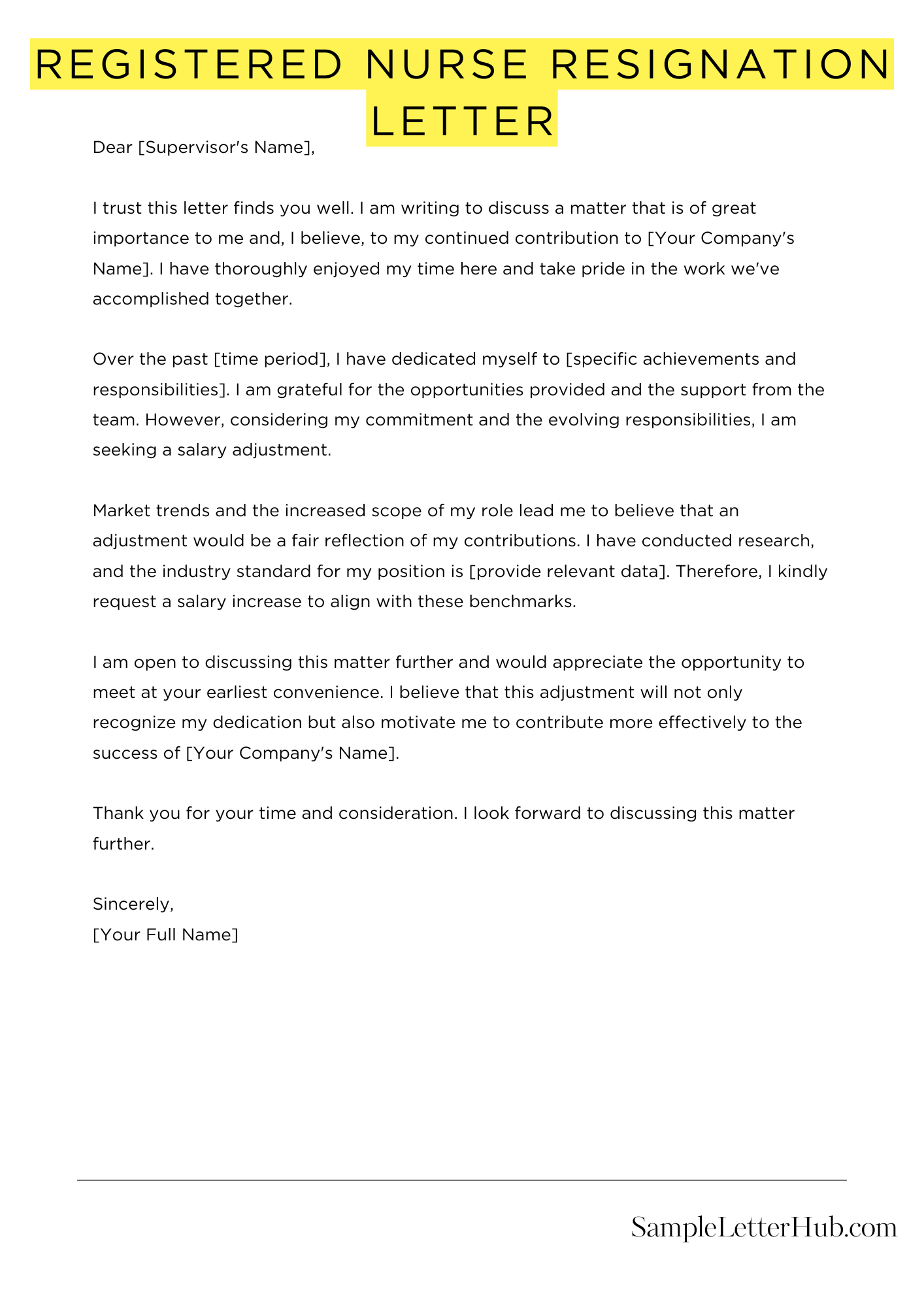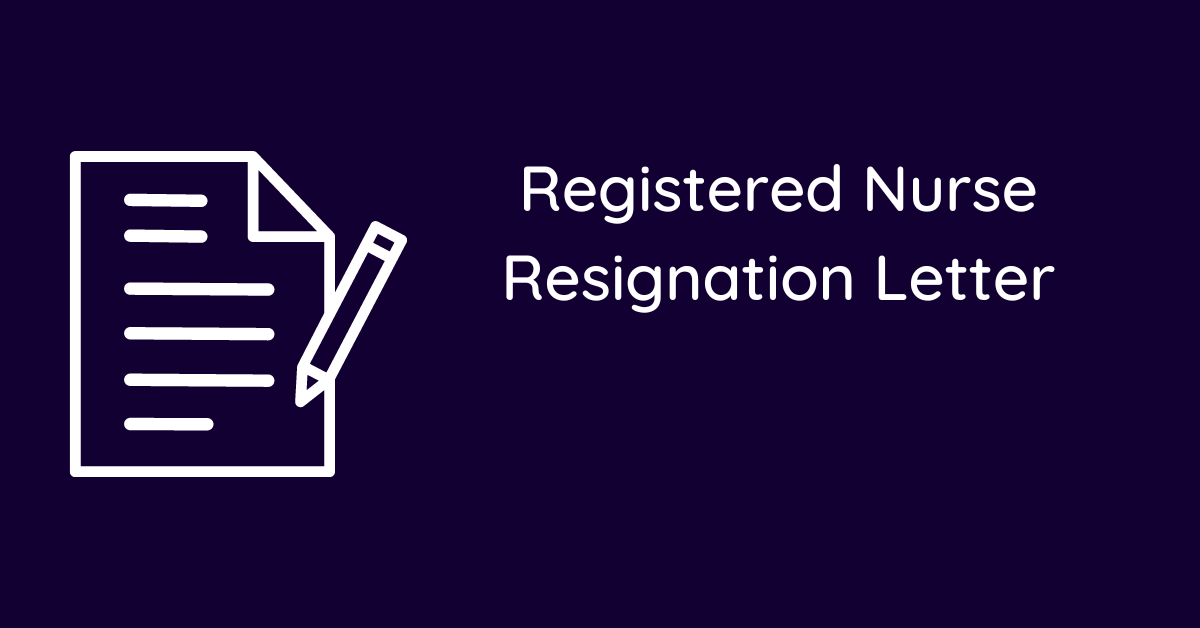It can be daunting to write a registered nurse resignation letter, but it doesn’t have to be. In this article, we’ll share an example of a registered nurse resignation letter with you to help you get started.
One way to leave a job is to write a clear and professional resignation letter explaining your decision to leave. Be polite and humble in your letter tone. Thank your employer for the opportunity to work there and express your gratitude for their support.
Below, we have shared a template/example registered nurse resignation letter that you can use. Feel free to adapt it to your own situation.
Registered Nurse Resignation Letter
Dear [Recipient Name],
Please accept this letter as formal notification that I will be resigning from my position as a Registered Nurse at [Organization Name], effective [Last Date of Employment].
I have enjoyed my time at [Organization Name] and am grateful for the opportunities and experiences I have gained. I have learned a great deal and have made valuable connections with my colleagues.
I wish you and [Organization Name] all the best in the future.
Sincerely,
[Your Name]
Short Registered Nurse Resignation Letter Sample
Please accept this letter as formal notification that I am resigning from my position as Registered Nurse at [Company Name]. My last day of employment will be [Your Last Day]. Thank you for the opportunity to grow and learn during my time here. I wish you and the company continued success. I am happy to assist in the transition process to ensure a smooth handover of my responsibilities.
I wish you all the best with your registered nurse resignation letter.
When it’s time to say farewell, expressing your gratitude and best wishes can make the transition smoother:

How to Write a Registered Nurse Resignation Letter
1. Start with a Formal Introduction
Begin your letter with a formal salutation, such as “Dear [Manager’s Name].” Clearly state your intention to resign from your position as a registered nurse, including the date your resignation will take effect.
2. Express Gratitude and Appreciation
Take this opportunity to express your gratitude for the opportunities and experiences you’ve gained during your time at the organization. Mention specific individuals or projects that have made a positive impact on your career.
3. State Your Reasons for Leaving (Optional)
While it’s not always necessary to provide a detailed explanation for your departure, you may choose to briefly state your reasons for leaving. Be professional and respectful, focusing on positive aspects such as career growth or personal circumstances.
4. Offer Assistance with the Transition
Demonstrate your commitment to a smooth transition by offering to assist in any way possible. This could include training your replacement, providing documentation, or participating in handover meetings.
5. End with a Professional Closing
Conclude your letter with a formal closing, such as “Sincerely,” followed by your typed name and signature. You may also include a personal touch by adding a handwritten note expressing your best wishes for the organization’s future success.
Registered Nurse Resignation Letter: 6 Frequently Asked Questions
Resigning from a nursing position can be a daunting task, but it’s important to do it professionally and respectfully. Here are six common questions and answers to help you write an effective resignation letter:
1. What should I include in my resignation letter?
Your resignation letter should include your name, position, date of resignation, and a brief statement expressing your gratitude for the opportunity to work at the organization. You can also mention your reason for leaving, but keep it brief and professional.
2. How long should my resignation letter be?
Your resignation letter should be concise and to the point. Aim for one or two paragraphs, and avoid unnecessary details or rambling.
3. Do I need to give a reason for leaving?
It’s not mandatory to provide a reason for leaving in your resignation letter, but it’s generally considered good practice to do so. If you’re comfortable sharing your reason, keep it brief and professional.
4. How much notice should I give?
The amount of notice you give will depend on your contract and the policies of your organization. It’s always best to check with your supervisor or HR department to find out what the expected notice period is.
5. Can I negotiate my notice period?
In some cases, you may be able to negotiate your notice period with your supervisor. However, it’s important to be reasonable and understand that your organization may have specific needs.
6. What should I do after I submit my resignation letter?
Once you’ve submitted your resignation letter, it’s important to continue to perform your job duties professionally and respectfully. You should also offer to help with the transition process and train your replacement.
Before making the decision to resign from your job, it’s essential to consider the legal aspects:
Understanding your emotions after quitting your job is important. Explore why you might be feeling sad:
Related
- Resignation letter sample
- Forced resignation letter
- Resignation letter due to going abroad
- Resignation letter due to marriage
- Resignation letter due to other opportunity
- Resignation letter due to mistake

